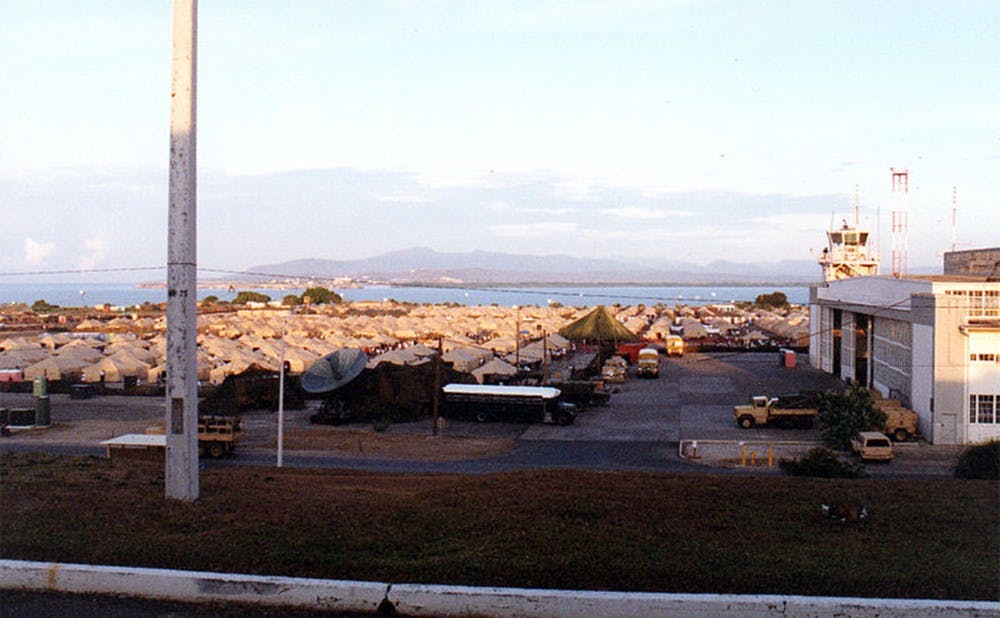This semester, 10 students from the Duke School of Law are getting hands-on practice with the rule of law by working to develop arguments for the defense of Khalid Shaikh Mohammed, alleged to be one of the key figures behind the terrorist attacks on Sept. 11, 2001.
After being detained for nearly 11 years, Mohammed will face the death penalty if he is convicted before the military commission at Guantanamo Bay. Professor of law Madeline Morris and lecturing fellow Gabriela McQuade, Law ‘10, are leading the students through the Guantanamo Defense Clinic. Members of the class work to research legal issues involved in the cases of Guantanamo prisoners and write briefs, motions and other documents for the defense team.
“The students get a view of the law and the process of lawmaking and law application that they would not otherwise get,” Morris said.
The clinic was first introduced as a Law School class in October 2005. At that time, Morris was looking to teach a law school class relating to key current legal issues. She reached out to Colonel Dwight Sullivan, who was serving as chief defense counsel for the Office of Military Commissions, which handles the defense of those who are tried in the military commissions system at Guantanamo Bay. The office was under-resourced and welcomed the possibility of help from law school students.
“I met with him in early October, and he wanted to know if there was any way we could start then, rather than in the following semester as I had proposed,” Morris explained. “What we did actually, unprecedentedly, was to begin a course in the middle of the semester.”
Since then, Morris’ class has played a part in the defense of Guantanamo detainees such as Omar Khadr—who was just 15 at the time of his detention—and Muhammad Al Nashiri, one of the principle architects of the bombing of the U.S.S. Cole, Morris said. Students from the course have also been sent to observe military commission proceedings in person at Guantanamo Bay.
“I have a tremendous amount of respect for [the lawyers in the case] because as lawyers and citizens of the country they really believe in the rule of law and the right to a fair trial and are advocating on behalf of their clients for those rights that everyone else in our system has,” said Julie Coleman a third-year law student who participated in the Clinic last year.
Morris said that Duke Law School was the first law school to work with the defense counsel at Guantanamo and that very few other law schools, if any, have similar programs.
“Duke Law School was the first school, I believe, to provide this form of assistance, in the form of a clinic program, to the Chief Defense Counsel,” Morris said.
The first case Morris and her students worked on was Hamdan v. Rumsfeld, which eventually went to the Supreme Court. Danny Beaulieu, a second year law student and current member of the class, said arguments from the clinic were cited in the Supreme Court briefs for the Hamdan case.
“It was definitely surreal to sit in on the most important trials that we’ll see in our time. And for me personally being involved in the clinic and going down and observing the trials had a huge impact,” Coleman said.
As a result of their work, the clinic has been granted observer status by the Office of Military Commissions, which allows students from the clinic to go to Guantanamo every semester and observe commission proceedings.
“To a person, every student that has the opportunity to go has found that quite eye-opening. Watching that process and engaging in the discussions that happen in the margins allows students to have an insight that otherwise wouldn’t be possible,” Morris said.
Part of the challenge presented to the defense teams as well as the clinic students was that the law applicable to military commissions was almost completely nonexistent a few years ago and is still being developed, she noted.
“The law is wide open in this area,” Morris said. “There’s just not very much law there and what law there is tends to be flawed because it’s so rarely used. You can count on one hand the number of times we’ve used military commissions so the law is not well developed.”
McQuade said the class accumulates a significant institutional memory with regards to these novel legal issues. This can often be helpful for the military attorneys working on the cases, since turnover in the Office of Military Commissions is high, she said.
“It’s primarily military officers who are there and they are often reassigned after their completing their detail of only a couple of years.” McQuade said. “We’re in our eighth year here.”
Christopher Pilch, a third year law student in the class, said the program helps to strengthen Duke Law’s national security and international law programs by giving students hands-on experience dealing with current legal issues. Several students in the class intend to work for the Judge Advocate General’s Corps in one of the service branches once they graduate, he said.
When asked about potential criticism the clinic might receive for working on the defense of alleged high-level terrorists, Morris explained that the work they do is much more about the process than the individuals.
“Our system is one in which the government is required to prove its case and the defense is entitled to a full and adequate representation,” Morris said. “If we want to maintain our system of government, it’s crucial that we do it in this context.”
Get The Chronicle straight to your inbox
Signup for our weekly newsletter. Cancel at any time.

